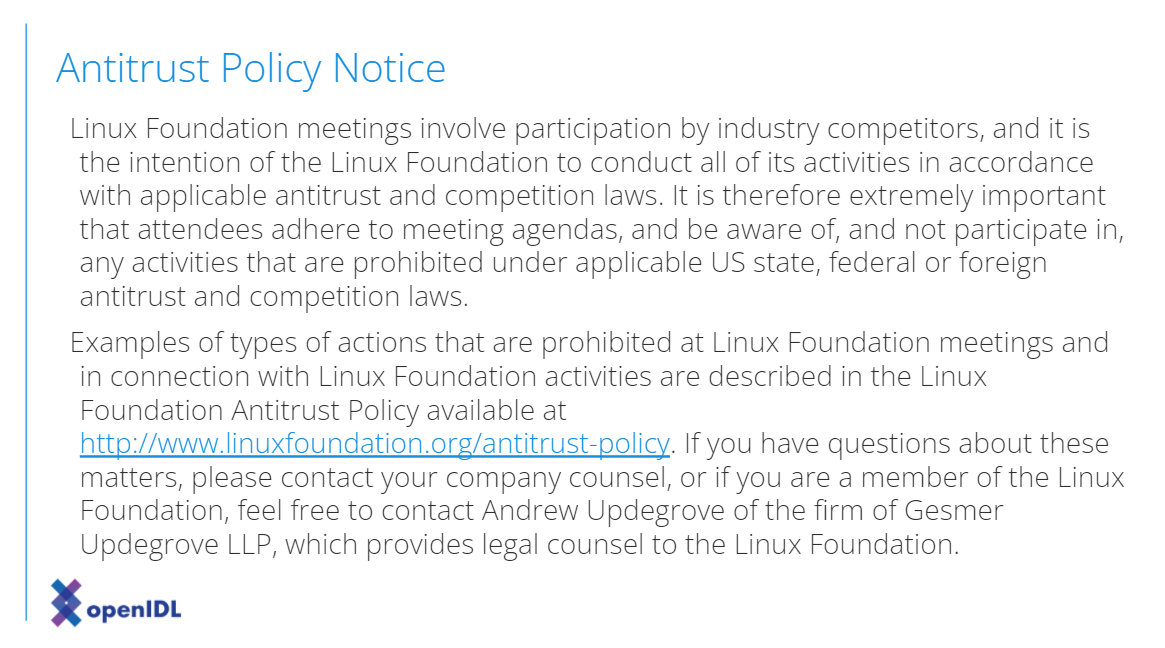openIDL Navigation
Date
This is a weekly series for The Regulatory Reporting Data Model Working Group. The RRDMWG is a collaborative group of insurers, regulators and other insurance industry innovators dedicated to the development of data models that will support regulatory reporting through an openIDL node. The data models to be developed will reflect a greater synchronization of data for insurer statistical and financial data and a consistent methodology that insurers and regulators can leverage to modernize the data reporting environment. The models developed will be reported to the Regulatory Reporting Steering Committee for approval for publication as an open-source data model.
openIDL Community is inviting you to a scheduled Zoom meeting.
Join Zoom Meeting
https://zoom.us/j/98908804279?pwd=Q1FGcFhUQk5RMEpkaVlFTWtXb09jQT09
Meeting ID: 989 0880 4279
Passcode: 740215
One tap mobile
+16699006833,,98908804279# US (San Jose)
+12532158782,,98908804279# US (Tacoma)
Dial by your location
+1 669 900 6833 US (San Jose)
+1 253 215 8782 US (Tacoma)
+1 346 248 7799 US (Houston)
+1 929 205 6099 US (New York)
+1 301 715 8592 US (Washington DC)
+1 312 626 6799 US (Chicago)
888 788 0099 US Toll-free
877 853 5247 US Toll-free
Meeting ID: 989 0880 4279
Find your local number: https://zoom.us/u/aAqJFpt9B
Attendees
- Dale Harris
- Eric Lowe
- James Madison
- Ken Sayers
- Kevin Petruzielo
- Kristin McDonald
- Libby Crews
- Megan Ebling
- Peter Weinstein
- Ruturaj Waghmode
- Sandra Darby
- Truman Esmond
- Daniela Barbosa
- Susan Chudwick
Goals
Discussion items
| Time | Item | Who | Notes |
|---|---|---|---|
| 1 | Anti Trust | Peter | |
| 4 | Agenda | Peter | We can add items |
| 20 | Final Review of Charter | Group | Goal is to do final review- Regulatory Reporting Data Modeling Working Group Charter |
| 30 | Business Rules | Group | Attributes Index |
| 5 | Plans for next week | Group |
Action items
Overview
Content Tools

2 Comments
James Madison
Per my action item on putting together a list of the global traits a data model should have, it's below. Per the discussion of approval, this is 100% industry knowledge, so I'm not worried. You can find this in some industry literature somewhere–I just consolidated it. It's not even from a particular company standard. Just stuff from doing modeling for a quarter century. The COLUMN label means you can solve some/all of it at model definition time. The ROW label means the ETL jobs when it loads rows has a part to play. May need both. I'm sure there are more, but this is a good start. Not all are self-explanatory, but happy to discuss more in our meetings.
Other opinions very welcome. This is just my two cents.
Thanks!
Ruturaj Waghmode
Thanks James.